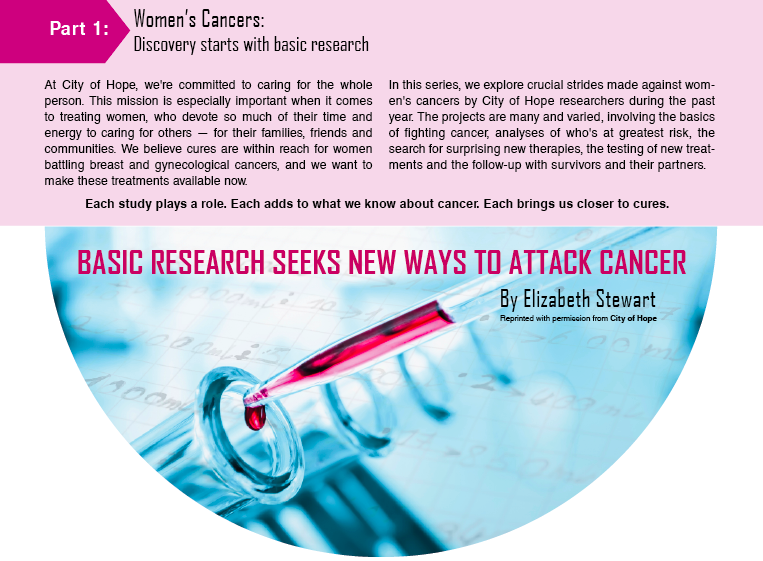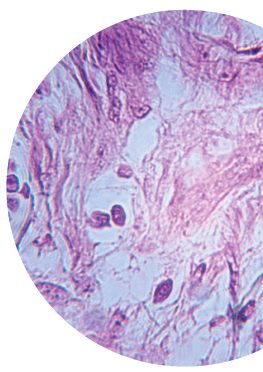
Advances in immunotherapy
Peter P. Lee, M.D., chair of cancer immunotherapeutics and tumor immunology at City of Hope, is pursuing several projects that are part of a what he calls integrated immunotherapy. This concept advances the idea that effective cancer treatment must address each phase or action of the body’s complex immune system.
In one project, Lee is studying the role of stromal cells, which make up connective tissue. He has found that stromal cells support cancer by attracting and modulating immune cells. His team is currently developing three-dimensional microculture systems to study the interactions among stroma, cancer and immune cells in tumors, with a goal of learning how to disrupt cancer’s support system and restore immune function.
Lee is also advancing the use of spectral imaging. Using powerful new technology, Lee is able to see two- and three-dimensional images of the location of cells, making it possible to understand how immune cells and cancer cells interact within the tumor and sentinel nodes (lymph nodes found under the arm, and often the first site of metastasis for breast cancer). One of the leaders in this sophisticated imaging technique, Lee recently led a worldwide webinar to teach other researchers about spectral imaging.
A novel way to target cancer
Yuan Yuan, M.D., Ph.D., assistant professor of medical oncology, is studying how tumor cells use nutrients to grow and proliferate, and how this process differs from normal cell metabolism, so that she can selectively target cancer cells. Yuan is collaborating with David Ann, Ph.D., professor of molecular pharmacology, who found that some types of breast cancer cells lack a specific enzyme and, as a result, need the amino acid arginine to grow.
Together, their research demonstrates how to deprive these cells of arginine and suppress tumor growth. Yuan seeks to translate this novel research to the clinic, where it will be the focus of a first-of-its-kind study for women with breast cancer.
How genes help cancer spread
Emily Wang, Ph.D., associate professor of cancer biology, focuses her research on understanding how microRNAs (miRNAs) regulate gene expression to promote or prevent cancer. She has found that breast cancer cells secrete specific miRNAs that dictate gene expression in healthy cells at potential metastatic sites for breast cancer.
Wang’s studies also showed that treatment with a miRNA inhibitor significantly delayed metastasis — suggesting a novel therapeutic strategy to prevent or treat metastatic breast cancer. Wang is collaborating with Yuan to translate these findings to the clinic.

Molecular imaging and disease
Tijana Jovanovic-Talisman, Ph.D., assistant professor of molecular medicine, recently joined City of Hope to advance her research using super resolution microscopy. Jovanovic-Talisman is using this sophisticated imaging method to see and quantify proteins on the cell membrane and inside cells. On a biological level, this method allows Jovanovic-Talisman to better understand protein signaling, both in normal cells and in cells affected by disease. She is also collaborating with other researchers at City of Hope to design new compounds to target cancer cells.
In one effort, Jovanovic-Talisman is studying the tumor marker called nucleoporins 88, which is overexpressed in solid tumors, including breast and ovarian cancers. She is currently designing mimics, down to the nanometer scale, of the biological processes that are occurring in cancer and healthy cells. These models will be used to further understand how nucleoporins 88 causes cancer and to test drugs that target the molecule.
The quest for a novel therapeutic
Linda Malkas, Ph.D., associate chair and professor of molecular and cellular biology and the deputy director of basic research, is focused on identifying compounds that selectively target cancer. Previously, Malkas found a target in cancer cells, called cancer-associated proliferating cell nuclear antigen, that plays a role in DNA repair and helps cancer survive and proliferate.
Now, she is collaborating with City of Hope’s molecular chemists to modify small molecules that selectively block the antigen. Together, they have created a highly active synthetic compound called AOH1160. Recent animal studies have shown that AOH1160 is effective at inhibiting tumor growth. This exciting new compound could lead to a novel therapeutic for women fighting breast cancer.
Silencing genes to target cancer
Carlotta Glackin, Ph.D., associate professor of neurosciences, studies a protein called Twist1, which is overexpressed in many aggressive cancers, including breast and ovarian cancers. She is working to develop targeted therapeutics that inhibit Twist1 and stop cancer.
In collaboration with John Rossi, Ph.D., Lidow Family Research Chair and chair and professor of molecular and cellular biology, Glackin is exploring the use of small-interfering RNA (siRNA) bound to nanoparticles to deliver gene-silencing materials to tumors and block the expression of Twist1. Glackin studied this approach in cell lines and found that it was effective. Now, she is studying this therapeutic in animal models, and hopes to open a clinical trial at City of Hope. Glackin’s research provides another promising approach to therapy that could bring healing to so many women battling cancer.
—
Next: Part 2: Studies of risk and prevention

 Login
Login
